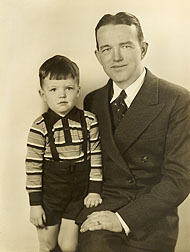
By
A funeral Mass was held March 18 at St. Bartholomew Church in Needham for John R. “Jack” Shea ’58, a former Boston College faculty member who was the recipient of the famous “Letter to Jackie” – a wartime message from his father considered by many as a touchstone of classic American values.
Dr. Shea, who taught part-time in the Classical Studies Department for many years, died on March 14. He was 78.
A native of Arlington who graduated from Boston College High School, Dr. Shea was awarded a Woodrow Wilson National Fellowship – which encouraged college students to consider teaching careers at the university level – during his senior year at BC. He later earned his doctorate in classical philology at Harvard University.
But early in his life, Dr. Shea’s education had a uniquely personal, and tragic, dimension. In 1942, with the US at war, his father, Lt. Commander John J. Shea – a former BC football star – prepared to ship out for duty in the Pacific. In June, Commander Shea spoke by phone one last time with his wife and then his five-year-old son. “Daddy,” young Jackie told his father, “you’ll be home in two weeks.”
Sometime after that conversation, John Shea composed a letter to his boy explaining, as best he could, why his absence would extend far longer than two weeks: “Because there are people and countries who want to change our nation, its ideals, form of government and way of life,” he wrote, “we must leave our homes and families to fight.” Protecting America, he told Jackie, “is an honor and a duty which your daddy has to do before he can come home to settle down with you and mother.”
Commander Shea also sought to inculcate in Jackie the virtues of honor and duty to uphold at home, and to offer guidance he believed would benefit Jackie. “Study hard when you go to school. Be a leader in everything good in life. Be a good Catholic and you can’t help being a good American. Play fair always. Strive to win, but if you must lose, lose like a gentleman and a good sportsman. Don’t ever be a quitter either in sports or in your business or profession when you grow up.”
After passing along more such advice, Commander Shea concluded by asking Jackie to pray for his return. “And if it is God’s will that he does not, be the kind of boy and man your daddy wants you to be.”
[The full version can be read at http://bcm.bc.edu/issues/winter_2002/jackie_letter.html.]
On Sept. 15, 1942, Commander Shea was killed in action near Guadalcanal.
But the “Letter to Jackie” ensured that Commander Shea’s memory, like his tribute to American values and beliefs, lived on. The Boston Globe, New York Times and other publications picked up the story and the letter was widely reprinted. After Dr. Shea’s three sisters – all teachers in Boston and Cambridge – shared the letter in their classrooms, copies were distributed for classroom use in Boston schools. Major figures of the day, including Boston Archbishop Richard Cushing, extolled its tone and contents.
A super-destroyer was christened the USS Shea – Dr. Shea and his mother attended the launch – and in 1963 Boston College named its baseball field after Commander Shea. The Burns Library included a copy of the letter in its archives, and over the years became one of its most requested items.
Dr. Shea began teaching ancient Greek and Latin language classes at BC in 1975, and occasionally taught courses on literature and etymology. In 2001, Dr. Shea donated the original Letter to Jackie to BC.
Interviewed by Boston College Magazine in 1991, Dr. Shea, by then himself a father of three, reflected on the letter and its impact. “In the space of several handwritten pages, he put down things that I hope I have communicated to my kids. I think what made the letter so appealing [to the public] is that he took some thoughts which were probably shared by many, and expressed them very directly.”
The fact that these feelings of patriotism and civic values were voiced by a Catholic, he added, was significant at the time, since Catholics were not yet viewed as part of the American mainstream.
In a 2001 Boston Globe story reporting on Dr. Shea’s donation of the letter, University Historian Thomas O’Connor explained the impact it had on wartime America.
“The Allied forces were losing everywhere. Hitler had invaded Russia. The Japanese were taking over the Pacific. People were asking, ‘Where did we go wrong?’ Then this letter came out and reaffirmed all the best values people thought we had lost.”
He added, “Not only is it a historical treasure, it speaks to the values of the college itself in ways we have trouble articulating today. Future generations will profit immeasurably from this.”
BC colleagues said that Dr. Shea enjoyed a successful and productive career as a teacher, researcher and translator. One of his major achievements was his extensive translation, from Renaissance Latin into English, of 16th-century physician Johann Weyer's treatise De praestigiis daemonum, regarded by many scholars – “one of the 10 most significant books of all time,” according to Sigmund Freud – as an important work for Weyer’s encyclopedic grasp of biblical, classic and patristic literature. In addition to translating the book, his colleagues noted, Dr. Shea provided most of the biblical and classical citations for the book's notes.
“Jack was respected and loved because of who he was and how he treated students, colleagues and other people,” said Classical Studies Research Professor Dia Philippides.
Dr. Shea is survived by his wife, Claudette; his son, John T. Shea, and daughters Laura Knowles and Christine Pitts; and nine grandchildren.



